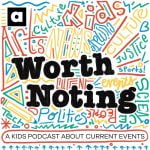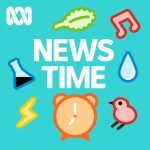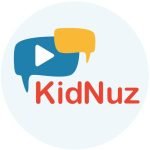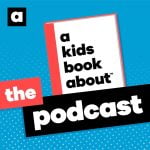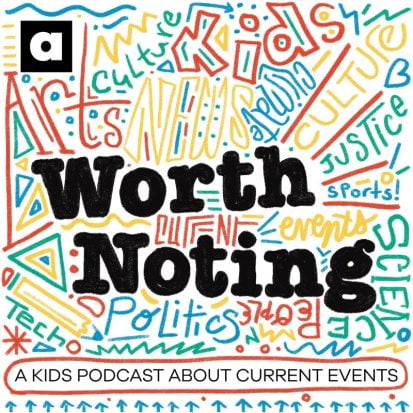
Our Differences Are a Good Thing with Tiffany Jewell
Leave a reviewTiffany Jewell shares The Antiracist Kid, a book that teaches young children the words, language, and methods to recognize racism and injustice–and what to do when they encounter it at home, at school, and in the media they watch, play, and read.
© A Kids Company About | 21:25
|Season: 6 |Episode: 3 |
Full episode description
 Episode One: Nic Stone
Episode One: Nic Stone
This is an Episodic show. You can listen to it in any order, but episode one is always a great place to start.Full Episode description
Tiffany Jewell shares The Antiracist Kid, a book that teaches young children the words, language, and methods to recognize racism and injustice–and what to do when they encounter it at home, at school, and in the media they watch, play, and read.
BOOK DESCRIPTION: The Antiracist Kid: A Book about Identity, Justice, and Activism by Tiffany Jewell; illustrations by Nicole Miles
From the #1 New York Times bestselling author of This Book Is Anti-Racist, Tiffany Jewell, with art by Eisner-nominated illustrator Nicole Miles, The Antiracist Kid is the essential illustrated guide to antiracism for empowering the young readers in your life!
What is racism? What is antiracism? Why are both important to learn about? In this book, systemic racism and the antiracist tools to fight it are easily accessible to young readers.
In three sections, this must-have guide explains:
Identity: What it is and how it applies to you
Justice: What it is, what racism has to do with it, and how to address injustice
Activism: A how-to with resources to be the best antiracist kid you can be
This book teaches young children the words, language, and methods to recognize racism and injustice–and what to do when they encounter it at home, at school, and in the media they watch, play, and read.
NOTABLE QUOTES:
(5:07) “Anti-racism is making a choice to be active and resist racism.”
(6:58) “All of those questions have been questions that real kids have asked me over time, my own students, my own kids, kids I’ve come across, worked with my friend’s kids.
So, when I look at certain questions, I am picturing very specific people.”
(7:19) “It’s a book I wanted in my classroom, but never had. I want it in my home. And now it can be.”
(10:53) “With my friends, we have similarities that brought us together. But then it’s the things that make us different that keep our friendships going. Otherwise, I think we’d get bored with each other.”
(12:14) “Sometimes we don’t feel like family, but we can be friends. And I think that’s really important, too. And we don’t even have to be friends. We just have to know that other people exist and we’re not the same.”
(13:57) “All of the things that made us different, made us a whole community.”
(14:37) “The thing that makes us really special is we’re all really different and we know how to be together and get along even though we’re different.”
(15:31) “I love not just teaching kids new things, but I love when the adults have those a-ha moments, too.”
(19:22) “There’s always some grownup who is there, ready to listen and redistribute some power. Cuz we got you and we trust you to move us along in a direction that is like more liberatory and anti-racist than where we are now.”
ADDITIONAL LINKS:
Tiffany Jewell website – tiffanymjewell.com
Purchase the Book – The Antiracist Kid: A Book about Identity, Justice, and Activism
“Arkansas Gov. Sanders signs a law that makes it easier to employ children” (NPR; March 10, 2023; accessed July 19, 2023) – view article
TALK ABOUT THE EPISODE:
What are words that you use to describe yourself? What words, attributes, characteristics, interests, practices, and observations make up your identity? Which of these things are describers that someone might notice just from seeing you for the first time? Which are things that take time to know? Or may be things about yourself and your identity that you keep private from others?
What does justice look like? Can you think of any times when you have witnessed injustice, whether at school or on the news or in your community? What are ways that you might respond to these incidents of injustice? Who are people you could share with or work with in order to bring about positive change?
Tiffany shared that this book was formed around many, many questions she received from readers and students. What question(s) do you have about identity, justice, activism, and/or antiracism?
CREDITS:
This podcast episode of The Children’s Book Podcast was written, edited, and produced by Matthew Winner. For a full transcript of this episode, visit matthewcwinner.com.
Write to me or send me a message at matthewmakespods@gmail.com.
Our podcast logo was created by Duke Stebbins (https://stebs.design/).
Our music is by Podington Bear.
Podcast hosting by Libsyn.
You can support the show and buy me a coffee at www.matthewcwinner.com.
We are a proud member of Kids Listen, the best place to discover the best in kids podcasts. Learn more at kidslisten.org.
Fellow teachers and librarians, want a way to explore building a stronger culture of reading in our communities? In The Reading Culture podcast, Beanstack co-founder Jordan Bookey hosts conversations that dive into beloved authors’ personal journeys and insights into motivating young people to read. And I am a big fan! Check out the Reading Culture Podcast with Jordan Bookey, from Beanstack. Available wherever podcasts are found.
DISCLAIMER: Bookshop.org affiliate links provided for any book titles mentioned in the episode. Bookshop.org support independent bookstores and also shares a small percentage of any sales made through this podcast back to me, which helps to fund production of this show.
© A Kids Company Aboutbop| Status: Active, 388 episodes | Kind: Episodic | Episode URL
The content, Artwork and advertising within this podcast is not owned or affiliated with Sound Carrot and remain the property of their respective owners.
